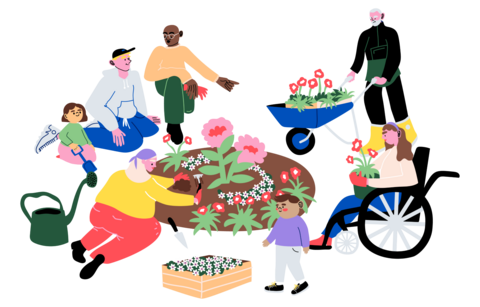Espoo's new Wellbeing Plan is created through wide cooperation
Big and difficult questions combined with topics that inspire people to seek solutions together. Such are the City of Espoo’s new focus areas in the promotion of well-being and health for the next four years.
The promotion of mental wellbeing and safety and the reduction of loneliness have been chosen by the City of Espoo as its focus areas in the promotion of wellbeing and health for the next four years.
These focus areas guide the preparation process of the new wellbeing plan. The wellbeing plan defines how the City of Espoo promotes the wellbeing and health of its residents in 2025–2029.
The plan defines goals for the promotion of wellbeing and health. It also specifies the indicators used for monitoring the implementation of the goals. The city’s strategy, the Espoo Story, is implemented through various measures, which also support the implementation of the wellbeing plan.
Wide cooperation for seeking solutions
The themes of the focus areas are familiar and recognisable both in people’s everyday lives and in wider societal discussion. They represent challenges that Espoo and many other municipalities are working to solve.
Finding solutions for such large questions requires cooperation.
For this reason, joint workshops for the wellbeing plan were held during the autumn with Espoo’s experts, partners and various advocacy bodies. The workshops included participants from the Elderly Council, the Disability Council, the Youth Council, the various sectors of the city and other organisations.
The workshops helped ensure the collection of as much information and expertise as possible on the wellbeing and needs of Espoo residents.
Workshops highlight ideas
In the workshops, participants planned goals and measures for increasing the support for mental wellbeing and safety. Here are some examples of the goals and measures proposed in the workshops.
- Every young person should have a meaningful hobby. Espoo should offer a wide range of free hobby opportunities or provide club activities in schools.
- Organising cultural opportunities for older people.
- Building accessible sports facilities.
- Supporting new business operations related to mental wellbeing, for example through a competition for ideas.
- Encouraging speakers of foreign languages to participate in city planning. Using cooperation to build trust and capacity for participation, among other things.
Active search for solutions
The City of Espoo’s Wellbeing Manager Taru Ikäheimonen considers the workshops to be a success.
”We wanted to consult different target groups during the preparation process, and this was very much appreciated,” Taru explains to summarise the participant feedback.
She believes that bringing out different perspectives will also produce the best results. Wellbeing is not born from a single high-ranking person or team, but rather through listening and discussions.
In the workshops, people were not intimidated by the big challenges, and instead faced them with a solution-oriented approach.
”Evidently, we have the will to solve difficult problems together,” Taru says.
Next, the wellbeing plan’s objectives and indicators will be defined further. Another valuable source of information for the wellbeing plan are the Voxit discussions, which were organised in September for children, young people and people with functional difficulties and reduced mobility.
Espoo’s new wellbeing plan will be submitted to the City Council for approval in February 2026.
